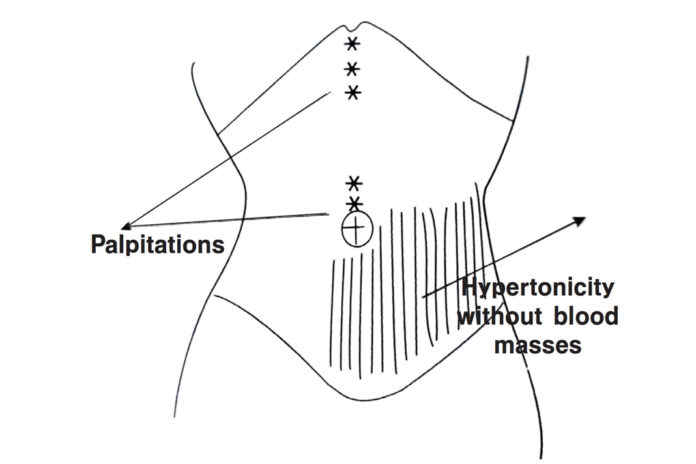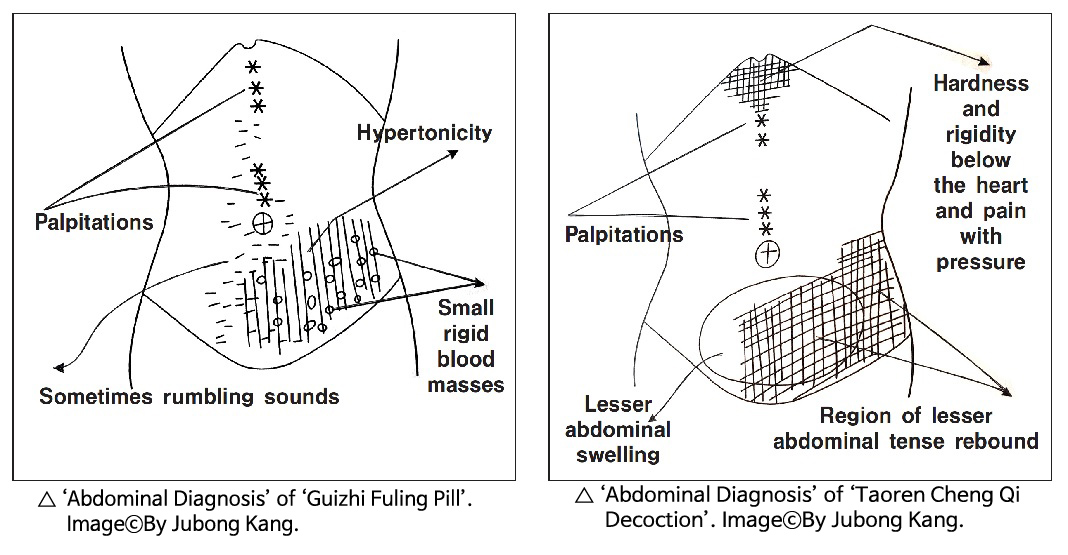By Jubong Kang, K.M.D.
Herbs: Dangui(當歸), Shaoyao(芍藥), Mudanpi(牧丹皮) Ex. Formulas: Danggui Shaoyao Powder (當歸芍藥散), Guizhi Fuling Pill (桂枝茯苓丸)
Sentence
A woman with a myoma of the uterus as usuall….the reason that a bloody discharger does not stop is because the uterus lump has not removed. As a matter of course, it should be precipitated, ‘Guizhi Fuling Pill’ governs.
Commentary
‘Danggui Shaoyao Power’ is used for a pattern of vacuity (a pattern of vacuity: ‘xu zheng’ 虛症), ‘Taoren Sheng Qi Decoction’ is for a pattern of heavy repletion (a pattern of repletion: ‘shi zheng’, 實證) and ‘Taoren Sheng Qi Decoction’ is for a pattern of heavy repletion (a pattern of heavy repletion: ‘da shi zheng’, 大實症). Interpretation of ‘Daggui Shaoyao Powder’ is in Kang’s book PART I, (4) ‘Guizhi Fuling Pill’ is in PART III, Chapter 3, 1, (3), and ‘Taoren Sheng Qi Decoction’ is in this article <6>.
<6> Lesser Abdominal Tense Bound (小腹急結)
Herbs: Taoren(桃仁). Ex. Formulas: Taoren Chengqi Decoction (桃仁承氣湯, composed of Taoren, Guizhi, Gancao, Mangiao, Dahunang)
Sentence
When a ‘Greater Yang Disease’ is unresolved and heat binds in the bladder, the person is as if manic, and spontaneous blood descent will bring recovery. If the exterior has not been resolved, one should not yet attack, but should first resolve the exterior. When the exterior has been resolved, and there is only a tense bound lesser abdomen. One can attack, and ‘Taoren Sheng Qi Decoction’ is appropriate. (“Shang Han Lun”) Line 106, p. 202, PPV
Commentary
‘Sign symptom’ – ‘lesser abdominal tense bound’ appears in the case of the time that condensed blood is severely stagnated in the organs of the ‘lesser abdomen’, such as the uterus, the urinary bladder, the iliac colon, the pelvic colon, or sigmoid colon.
Especially in the process of high fever sickness, much water is drained out due to severe sweating or diarrhea; therefore, condensed blood stagnates in the region of the ‘lesser abdomen.’
‘Lesser abdominal tense bound’ is when the lesser abdominal region is palpated, then the patient immediately folds and draws the foot and knee up because of the sharp pain, thus the name of the responsive action.
In the above-underlined sentence, we can understand that the phenomena that ‘the person is as if manic’ comes out due to strongly stagnated blood in the bladder, by an explanation in this provision.
The strongly stagnated blood means that the blood circulation in the brain is also condensed, and in this situation, this condensed blood is coming to be stagnated by the heat from unresolved ‘greater yang disease.’ The condensed blood contains high accumulations of oxygen and sugar, which supply too much heat to the brain cells so that the state of ‘as if manic’ appears.
By ‘constitutional organ theory’ in “Dong Yi Su Se Bo Wen”, both ‘sign symptoms’ – ‘as if manic’ and ‘lesser abdominal tense bound’ appear in ‘winter-type’ because he has ‘bigger liver’ and ‘smaller spleen’ therefore the blood can be easily condensed by water loss in the progression of illness of fever.
In this case, if the patient experiences a bloody discharge spontaneously without herbs or help, then the strongly stagnated blood is expelled by itself, and his sickness will be recovered with no herbal prescription.
But if she has exterior symptoms without discharge of blood, then a suitable prescription should be given before attacking the strongly stagnated blood mass. After the exterior is resolved by the prescription, ‘Taoren Cheng Qi Decoction,’ it is appropriate to attack the strongly stagnated blood mass, as per the prior provision.
At this time, the lesser abdomen is hard and swollen, and the tongue and the lips are bluish because of the ‘stagnated blood’, and the region of ‘below the heart’ is generally ‘rigid’ but even when not forming a ‘glomus’ at ‘below the heart’ when the region is palpated with a slight pressure the patient feels pain.
For ‘sign symptoms and the rigid state of ‘below the heart’ ‘Dahuang’ and ‘Mangxia’ treat both stagnated blood in the lesser abdomen and rigid ‘qi’ bind ‘below the heart’ by their salty and bitter taste.


































